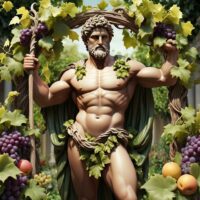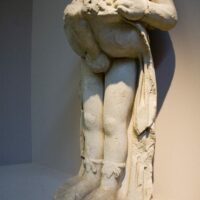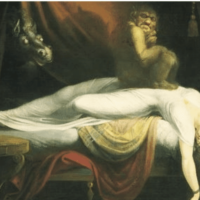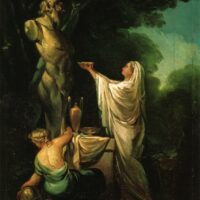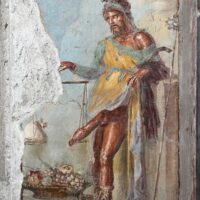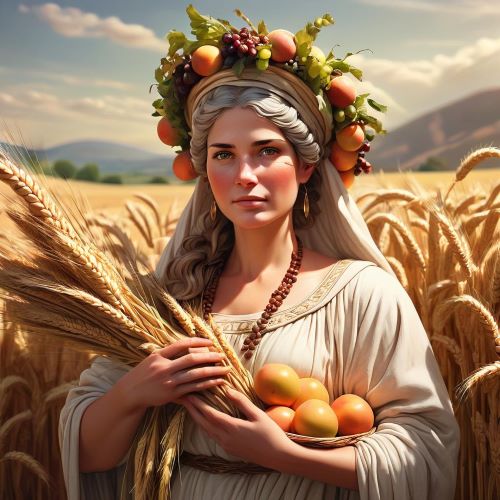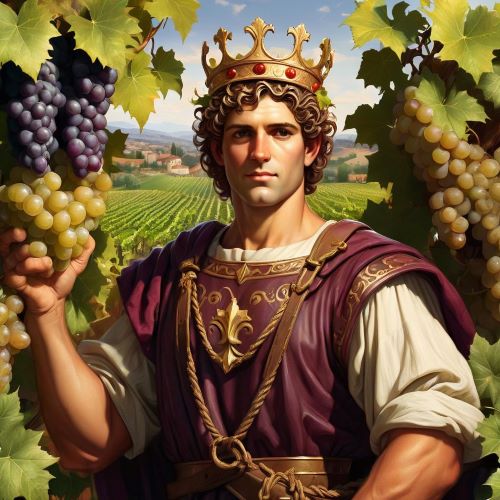Priapus : God of Male Fertility
Listen
At a glance
| Description | |
|---|---|
| Origin | Roman Mythology |
| Classification | Gods |
| Family Members | N/A |
| Region | Italy |
| Associated With | Fertility, Male genitalia, Gardens |
Priapus
Introduction
Priapus is a notable figure from Roman mythology, primarily known as the god of fertility, gardens, and male genitalia. His roots are found in Greek mythology, where he was revered as a protector of livestock, fruit plants, and gardens. Priapus is distinguished by his exaggerated and often humorous depictions, making him a unique presence in the Roman pantheon. Although not one of the more prominent deities, Priapus played an essential role in ensuring fertility, particularly for plants and livestock. His representation, often with a large phallus, emphasizes an exaggerated form of masculinity and sexuality, symbolizing nature’s fertility and the abundance of harvests. Initially worshipped in rural settings, his influence grew as Rome transitioned from an agrarian society to a more urbanized one. Priapus also served as a protective figure for gardens and vineyards, with his image frequently appearing in art and literature. Through his mythological role, Priapus offers insight into Roman views on sexuality, agricultural practices, and how mythology was woven into daily life.
Physical Traits
Priapus is often depicted as a robust, stocky figure with an exaggerated phallus, a symbol of his association with fertility and procreation. This characteristic, often emphasized for comedic effect, also highlights his role as a patron of agriculture. He is sometimes shown carrying a cornucopia, representing abundance and his connection to the harvest. In artistic portrayals, Priapus is frequently depicted with rustic elements like a sickle or vine, reinforcing his ties to the land and its fertility.
His simple, pastoral attire reflects the rural origins of his worship. One of his most notable features is his exaggerated phallus, which, beyond its symbolic connection to fertility, also played a protective role; statues of Priapus were often placed in gardens and fields to deter thieves and ward off evil spirits. This aspect of his physical form embodies the Roman ideals of masculinity, symbolizing strength and virility. Priapus’s imagery, found in sculptures and frescoes, merges humor with the sacred, serving both decorative and protective purposes in Roman gardens.
Family
The parentage of Priapus in Roman mythology is somewhat ambiguous, with different accounts attributing his origins to various gods. He is often described as the son of Dionysus, the god of wine and revelry, and Aphrodite, the goddess of love and beauty. Other traditions suggest that Hermes, the messenger god, or even Pan, the god of the wild, could be his father. These differing stories reflect the fluid and evolving nature of Roman mythology, where deities often had overlapping roles and attributes.
Priapus’s maternal connection to Aphrodite links him to themes of love and beauty, while his potential paternal ties to Dionysus, Hermes, or Pan highlight different aspects of fertility, trade, or rustic life. The variations in his lineage underscore the interconnectedness of the Roman pantheon, where gods often shared domains related to human desires, agricultural prosperity, and divine power. Some myths also suggest Priapus had siblings among the deities of pleasure and ecstasy, further illustrating the complex relationships within Roman mythology. Despite the inconsistencies in his parentage, Priapus’s identity remains firmly rooted in fertility and nature, attributes passed down from his divine parents.
Other names
Priapus is recognized by various names and titles across different cultural contexts. In some poetic references, he is known as “the Guardian of Gardens,” highlighting his role in protecting and promoting fertility in agricultural settings. His Greek counterpart, also named Priapus, embodies similar attributes of fertility and abundance within Hellenistic and Roman traditions. Regional variations of Priapus often merge him with local agricultural deities, adapting his role to specific landscapes and crops. In ancient literature, such as the works of Vergil and Ovid, Priapus appears as a symbol of abundance and fertility.
In Greek mythology, Priapus is sometimes associated with Heracles, who shares connections with fertility and strength. In certain Italian regions, he was worshipped under the name Mutunus Lutinus. This diversity in names and titles reflects Priapus’s multifaceted roles as a protector and promoter of growth, and his connections to other fertility deities like Pan and the satyrs further underscore his importance in agricultural and natural abundance.
Powers and Abilities
Priapus is renowned for his powers related to fertility, growth, and protection. His chief ability is to enhance fertility across plants, animals, and people. Devotees would call upon him to ensure bountiful harvests and the flourishing of crops. In addition to his fertility attributes, Priapus was believed to offer protection against malevolent forces. Statues of Priapus, often placed in gardens, acted as talismans to shield plants from evil spirits and prevent agricultural misfortunes.
Priapus’s worship also involved rituals and festivals celebrating fertility, with offerings made to secure protection from blight and to guarantee a successful harvest. His mythical role often includes attempts at seduction, linking fertility with the passionate nature of desire and illustrating how abundance is intertwined with sexuality. Thus, Priapus’s powers encompass not only the enhancement of fertility but also the safeguarding of well-being and prosperity.
Modern Day Influence
Priapus continues to impact contemporary culture through art, literature, and psychological studies, particularly those exploring sexuality and fertility. His distinctive imagery persists in various forms, from garden decorations to sexual arts, reflecting a deep-rooted human fascination with fertility. Modern literature and psychoanalytical discussions often use Priapus’s exaggerated traits to critique notions of masculinity and societal stereotypes.
The term “priapism,” which denotes a medical condition characterized by a prolonged erection, directly links back to Priapus, underscoring his association with male virility. His representation in art and symbolism continues to provoke discussions in feminist and gender studies, addressing issues of hyper-masculinity and its societal implications.
Priapus’s legacy also resonates in modern gardening and landscape design, where the concepts of nurturing and protection echo his ancient role as a guardian of crops. Festivals celebrating harvests may still invoke the spirit of Priapus, highlighting the ongoing relevance of fertility deities. His influence extends to popular culture and academic discourse, where his image and stories are used to explore themes of virility and abundance.
Related Images
Frequently Asked Questions
What is lorem Ipsum?
I am text block. Click edit button to change this text. Lorem ipsum dolor sit amet, consectetur adipiscing elit. Ut elit tellus, luctus nec ullamcorper mattis, pulvinar dapibus leo.
What is lorem Ipsum?
I am text block. Click edit button to change this text. Lorem ipsum dolor sit amet, consectetur adipiscing elit. Ut elit tellus, luctus nec ullamcorper mattis, pulvinar dapibus leo.
What is lorem Ipsum?
I am text block. Click edit button to change this text. Lorem ipsum dolor sit amet, consectetur adipiscing elit. Ut elit tellus, luctus nec ullamcorper mattis, pulvinar dapibus leo.
What is lorem Ipsum?
I am text block. Click edit button to change this text. Lorem ipsum dolor sit amet, consectetur adipiscing elit. Ut elit tellus, luctus nec ullamcorper mattis, pulvinar dapibus leo.
What is lorem Ipsum?
I am text block. Click edit button to change this text. Lorem ipsum dolor sit amet, consectetur adipiscing elit. Ut elit tellus, luctus nec ullamcorper mattis, pulvinar dapibus leo.

